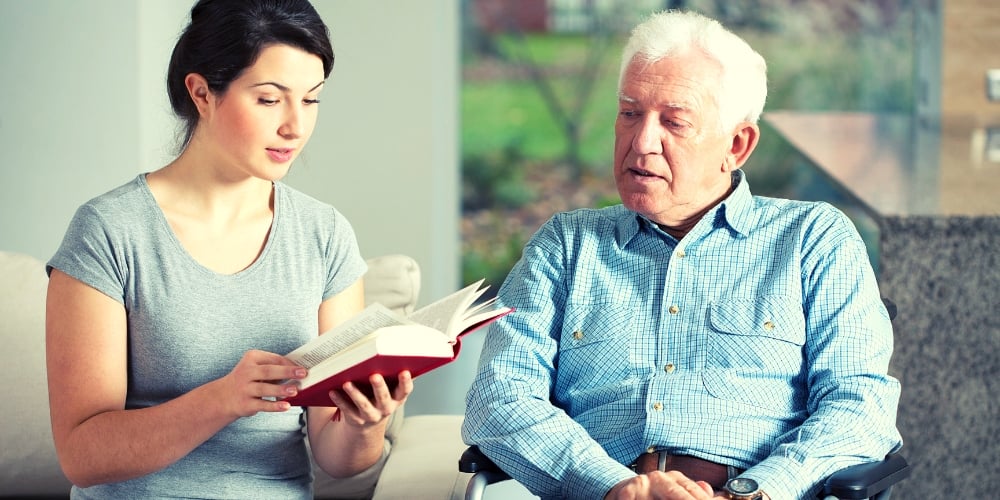Professional Advice on The Main Palliative Care Issues

Tags:
Palliative CareFebruary 8, 2019
Everyone knows that dealing with serious and terminal illnesses is tough for everyone involved and that facing the prospect of losing a loved one is one of the hardest situations in which you will find yourself. Until you find yourself in this position, there’s really no way to know what specific palliative care issues you might face or what palliative care questions you'll want to ask.
While all of the families we work with are in unique circumstances, they all face similar challenges, some of which we’ve described briefly here. The challenges in palliative care we cover are divided into two main groups, general and specific.
We hope that this information will help with your understanding of the main palliative care challenges that you and others in a similar situation might encounter, and it will help you to overcome them, making this time as comfortable as possible for your loved ones.
Palliative Care Guide - get your free copy
General Palliative Care Issues
The challenges that fall into this category are challenges that most families will face at some point in time no matter the medical condition of their loved one.
Medical and Pain Issues in Palliative Care
When someone embarks on the palliative care journey (see palliative care pathway), their medical needs change. Where the previous focus would have been on seeking a cure, when patients are in palliative care, the goal is to preserve their quality of life for as long as possible, and live as comfortably for as long as possible.

You may find that you need new medical equipment to cope with your loved one’s changing abilities, or that their medication changes significantly. Sometimes, it can take time to find the right medication for a particular patient, and there may be changing side effects.
At the same time, there are basic health issues like nutrition, hydration and personal hygiene to bear in mind.
If you find yourself in this position and feel that you need some guidance and possibly support with caring for your loved one you can get in touch with our expert team for help.
Care For Family works with multidisciplinary teams, specialists, hospitals and any practitioner who is involved in your care to fulfill your loved ones wish to live out their days at home. Our clients and their loved ones are supported by our palliative care nurses and care professionals who have extensive palliative care experience and knowledge to deliver the highest level of quality care.
Every aspect of in-home palliative care is completely tailored to each client.
Get a Free Palliative Care Support Assessment
Psychological Issues in Palliative Care
There is more to palliative care than symptom management. The broader impact of any illness, death and grief affecting loved ones and their families also needs to be considered and addressed. More importantly, physical, emotional and spiritual needs should be taken into consideration and addressed as part of any palliative care plan.
It’s always a good idea to speak to a professional counsellor. A psychologist whose particular expertise is in Palliative care can provide coping strategies to enable support for your loved ones and family members.
At Care For Family, we always offer the opportunity for palliative care counselling for the families and patients we support. If you’d like to know more about this kind of help, we’d love to hear from you.
Relationship Palliative Care Issues
When caring for a loved one, there’s a profound change that occurs between a loved one and their carers. This is particularly pertinent when the patient is a parent, and the caregiver a child. The altered dynamic of any relationship can put a strain on everyone involved, and it can be hard to figure out how to live with these changes and the new dynamic within the new relationship.
If these changes become too difficult to bear, it’s a strong signal that palliative care team support is needed. When you cannot be there, professionals such as the Care For Family team can provide the support you need.

Ethical Issues In Palliative Care
There is a range of ethical issues in palliative care, and questions that arise when dealing with illness. It is important that those involved in decision making are supported so that they too can be supportive and made aware of the ethical issues, a hallmark of high quality care.
Dealing with the requests of someone who is in pain and experiencing the effects of illness can be difficult when the patient is suffering.
There are of course medical choices that might need to be made when a person is too ill to make them themselves. Do you make choices that you would make for yourself, or do you know their wishes, and act on them?
It’s always a good idea to discuss tough topics openly and honestly with your loved ones, and to make your thoughts and position clear, so should you find yourself in this situation, you both know where you stand and what the palliative care plan will be. It is important to adhere at all times to your loved one’s values and beliefs.
Read the Palliative Care Guide
Palliative Care Legal Issues
Dealing with illness can have a variety of legal implications. Common legal issues, which are brought up during caring for your loved one are:
- Who will have the power of attorney when the time comes to make difficult decisions?
- What are your rights at work when you are caring for a loved one?
- Who takes care of the will and any requests within this?
- Who is in charge of any do not resuscitate documents and patient wishes?
When it comes to palliative care legal issues, it’s always best practice to speak to a lawyer. Getting everything arranged and on paper as soon as possible will prevent confusion at whatever stage you and your loved one find yourselves.
Cultural Palliative Care Issues
Australia is a multicultural country, and many Australians, especially older generations, may not have been born here. This may impact how cultural traditions are respected throughout the palliative care process.
It is important to respect the wishes of the patient when possible, even if you might have an alternate point of view. If it's feasible, your loved one should have the majority of the input.
Family Palliative Care Issues
When families deal with the illness and impending loss of a loved one, it takes a toll on everyone.
While you may be running around, and taking charge of many arrangements for the health and wellbeing of your loved one, it’s important to remember to take time for yourself. Taking the time to spend with your spouse and children or scheduling time to see friends are essential to maintaining your cherished connections.
Your loved one will want to see the people they care about too, so this is a great opportunity for involving other family members in the care process. It’s a great time to remember what’s really important in life and to make memories everyone will cherish forever.

Specific Challenges of Palliative Care
There can be very specific challenges relating to a few common illnesses, which can contribute to the day to day palliative care of your loved one, a few of which are documented below.
Palliative Care for Cancer Patients
Patients with cancer may be weak, have a poor appetite, and experience weight loss and side effects to medication and treatment. The biggest challenge facing most cancer patients is pain. Making sure that your medical team reviews dosages and pain medication choices frequently and discussing any concerns as soon as they arise, is vital. A key component in excellent palliative care is pain management, as your loved one should always be kept comfortable.

Palliative Care for Degenerative Brain Diseases
Degenerative brain diseases such as Dementia of which Alzheimer’s is one, have physical effects, and can also lead to delusions, violence, challenging behaviours, accidents around the home, as well as patients walking away from their homes and becoming lost.
An effective palliative care plan will involve speaking to your medical team to find out what you can do to support the patient during this time. Care For Family is experienced in implementing these care plans to ensure the safest possible environment for your loved one in their home.
Palliative Care for Chronic Obstructive Pulmonary Disease (COPD)
COPD affects one in seven Australians over the age of 40, and while it is treatable, there is no cure. As part of their palliative care plan, patients might require oxygen via CPAP (Continuous Positive Airway Pressure) devices and other specialised equipment to help them breathe.
Physical activity can be particularly taxing and it is essential you are aware of how to support your loved one if they are in this position. Medication management and avoiding triggers that exacerbate the condition is a crucial component of a COPD patient’s palliative care.
If It Gets Too Much, Get Help
We’d all like to be there for our loved ones and be strong for them at this challenging time. The truth is, palliative care issues do arise, and they can be overwhelming without the support of experienced care professionals.
Palliative care provided by experienced care professionals can give you the assistance you require, as well as speaking to volunteer organisations about respite care, ensuring you and your family are as involved as possible.
Whatever your palliative care needs are, the expert team at Care For Family are here to offer professional and compassionate support for you and your loved ones. If you are looking for advice on in-home palliative care and on creating a palliative care pathway, please do get in touch and we’d be happy to give you a quote tailored to the unique needs of your loved one.
You might also like to read the following posts about Palliative Care:
- What Is Palliative Care?
- Your Top Palliative Care Questions Answered
- What Happens When You Have In-Home Palliative Care?
- In-Home Palliative Care Support: What's Available
- Palliative Care Counselling: What You Need To Know
- What is a Palliative Care Pathway? And how does it work?
- The Remarkable Truth About Palliative Care Nursing
